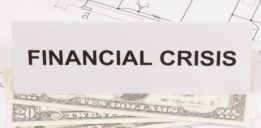Economic Collapse Will Result from Debt Oversaturation, Divorced From Fundamentals
There is no escaping the “everything bubble.” There’s a bubble in just about every facet of the economy: auto loans, student loans, housing, and equities. Oh, and let’s not forget the biggest bubble of them all: the 36-year bull market in the bond market that has been allowing cheap credit to be obtained.
Bubble economics is the “new normal” nowadays, propped up by central bank liquidity at all costs. When the subsequent bubble collapse comes (and it will come), will you be prepared?
Of course, all these bubbles have one factor in common: low interest rates. Without the spigots of cheap credit left wide open, none of this would be possible. It was only in the summer of 2016 that 10-year Treasury Notes yielded an historic low interest rate of 1.37%. Persistently low interest rates, combined with lax lending standards, have allowed consumer financing to spiral out of control, threatening to torpedo the economy in its wake.
Consider the sad state of the average American’s balance sheet. A full 50% of Americans owe at least $25,000 on their credit card, with an average American owing $37,000. This is a problem, considering that median individual incomes are only around $30,000. Americans are getting suckered into borrowing more than they can repay, because lenders are handing out credit like candy at Halloween. (Source: “45% Of Americans Spend Up To Half Their Income Repaying Credit Card Debts,” Zero Hedge, May 1, 2017.)
If we think about this logically, how is it possible that tapped-out consumers have such easy access to credit? How is it even possible that Americans owe these kinds of sums, excluding mortgage debt, with median incomes so low? The answer: financial lenders are counting on a U.S. Federal Reserve backstop when it all blows up.
And why wouldn’t they? The last vestiges of economic ethics have long been discarded onto the trash heap. The government’s response to the U.S. housing bubble saw to that. Car manufacturers, banks, re-insurance companies et al. received substantial amounts of money at taxpayer expense, when those businesses theoretically should have failed. Former Fed Chief Ben Bernanke is still patting himself on the back over the way he handled the crisis; he has even written a book about it.
Worse, there’s absolutely no indication that central banks would embark on a different course when the next U.S. economic crisis rears its ugly head. In their opinion, they’ve done a fantastic job in quelling the 2008 crisis. The recession was short, inflation is currently tame, and unemployment is now bouncing around all-time lows. Sure, growth is tepid, but the echo chamber keeps whispering sweet nothings in their ears. Systematic moral hazard is ingrained in a system unable to hear a different soundbite.
Hence, the die has been cast. The playbook calls for more debt, more credit creation, and more monetary debasement indefinitely. Without it, the economy would blow up and release a torrent of misery unlike anything seen in our lifetime.
There will be a time for introspection, then anger. But nothing can right the course of the ship heading for the iceberg. There’s no changing the dire U.S. economic outlook 2017 at this point. The “everything bubble” is here, and all that Americans can do is diligently prepare.
5 Ways to Survive the “Everything Bubble” Collapse
Here are some suggestions on the best ways to survive the event we know is probably coming. Is economic collapse imminent? Maybe, maybe not. But if you’re properly prepared, you’ll never have to worry about it. Some say piece of mind is more valuable than anything money can buy. I believe it.
5. Get Out of Debt at All Costs
Among the most important ways of surviving the “everything bubble” collapse is by eliminating your debt. The reason is simple: large amounts of debt impair cash flow, which hampers your ability to pay for everyday necessities. Adding personal debt is essentially reducing your future purchasing power, through the non-government “taxation” which follows as a form of interest payments. Uncle Sam is doing much the same thing, although the symptoms are masked by debt creation. Since individuals do not have the luxury of simply conjuring up money from thin air, their “Minsky moment” happens much sooner.
Also consider the interest-rate risk that all debtors are exposed to. No matter how long the trend has lasted, there’s no guarantee that interest rates will remain low. A meaningful rise in interest rates is glacially slow, but the rubber band will snap in the multi-decade bond rally—eventually. Once it does, interest payments for many Americans will simply become too much to bear.
Already, things like car loan payment delinquencies are at their highest level since the wake of the U.S. housing bubble, and the one-year Treasury note is only at 2.25%. Considering that long-term interest rates average around six percent, it wouldn’t take much movement to create a cascade of defaults on consumer loans. Everything from mortgages to lines of credit would be affected in an interest-rate bubble collapse.
But there is a way to avoid becoming a victim: get out of debt when and where you can. Not only will cash flow improve, you’ll increase your financial piece of mind.
4. Learn a Skill for Supplementary Income
This is tough one to accomplish for most people, since it’s a competitive world out there. It isn’t easy mastering a primary skill well enough to get paid, let alone mastering one on a part-time basis. But, for those willing to put in the hours to acquire an in-demand skill, the benefits can be dramatic. All those bills and out-of-the-blue expenses become much easier with two streams of income. This will be doubly true if inflation goes really high, and/or the purchasing power of the dollar plummets. Having an extra skill could ensure the continuity of your current lifestyle.
The biggest challenges are twofold.
First, you need to dedicate yourself to whichever endeavor you embark on; failure is not an option. It makes no sense to put in the hours for a couple of months then quit because you’re burnt out or don’t succeed right away. As mentioned earlier, it’s not easy mastering a second skill in one’s spare time. You need the proper time management skills, perseverance, and—most of all—work ethic. Expect 60-hour work weeks to be the norm. If you can’t meet this requirement—and many can’t—consider doing something else.
Second, finding the right skill to master can be challenging. It needs to be something within your personality and natural abilities. For example, if you’re the creative type, consider freelance writing or web design; if you’re handy with tools, try carpentry or mechanics; if you’re analytical, perhaps try your hand at short-term stock or currency trading. Please note, trading failure rates are about 99% (it’s a tough industry!).
Either way, with the proper mindset and dedication to achieve supplementary income, chances are you will probably eventually succeed. Just be aware that there are no shortcuts, and hard work is mandatory.
3. Sell Your Over-Inflated Metropolitan Property
Selling your over-inflated urban property accomplishes an important goal. It alleviates the risk of going into negative home equity, should the economy crash due to factors like local industry collapsing or interest rates surging.
Think it can’t happen in your city? Remember Detroit. It was once among the richest and most prosperous cities in America. Other major metropolises like Las Vegas, Jacksonville, Cleveland, and Hartford have also experienced major contractions, due to the loss of manufacturing or other local industries. Contrary to popular belief, major cities can experience profound adverse effects from changes in the business cycle; downturns aren’t limited to small rust-belt towns in flyover America.
Many older (retired) people are selling their urban homes at inflated prices and buying properties in smaller towns or rural areas at much lower costs. Not only is there little lifestyle downgrade (an upgrade, actually, in many cases), but the extra cash can help fund retirement shortfalls or eliminate debt loads. It’s a no-brainer, unless you really enjoy urban life.
2. Join Your Local Militia
You can get some amazing offensive and defensive training under your belt if you join a militia group. Militias generally include ex-military personnel and others who know how to handle firearms. Expert hand-to-hand combat expertise, such as how to subdue an oncoming attacker, is part of the equation. These types of skills can come in handy if you need to defend your property or you experience conflicts while competing for goods after an economic collapse 2017 and beyond.
Furthermore, aligning yourself with a militia is a great way to learn self-sufficiency. A militia’s ranks are generally filled with military, survivalist, and libertarian Americans who know how to survive without a government handout. Since government programs will inevitably get slashed when the cash crunch hits, self-survival skills will be very important. This is especially true for those who derive the majority of their income from either disability benefits, social security, or a fixed government pension. When the money runs out, you may need to apply these survival skills.
Having the right support network (outside of family) can make a world of difference after a bubble collapse.
1. Mobilize Your Employment
Granted, not everyone has the means to make their employment mobile. Many types of jobs require a physical presence on location, such as management or trades positions. But, if you can mobilize your employment, you put yourself at a tremendous advantage. Why? Because you may need to leave your community should an economic collapse devastate your district. Being tied to one location can leave you vulnerable to profound changes in your local environment.
Take the example of a computer programmer. Generally, this position allows for significant off-location hours, as it’s not client-facing. If your employer insists you work in-house, try to muster as much political capital as possible to ask for work-at-home privileges. Or perhaps you can think about freelancing or starting your own business. This would hedge against the possibility of losing your job in a bad financial crisis 2017 or an unfortunate outsourcing.
The key is to upgrade your skills to make your services in demand anywhere you go. Easier said than done, but it’s something you can strive for.







